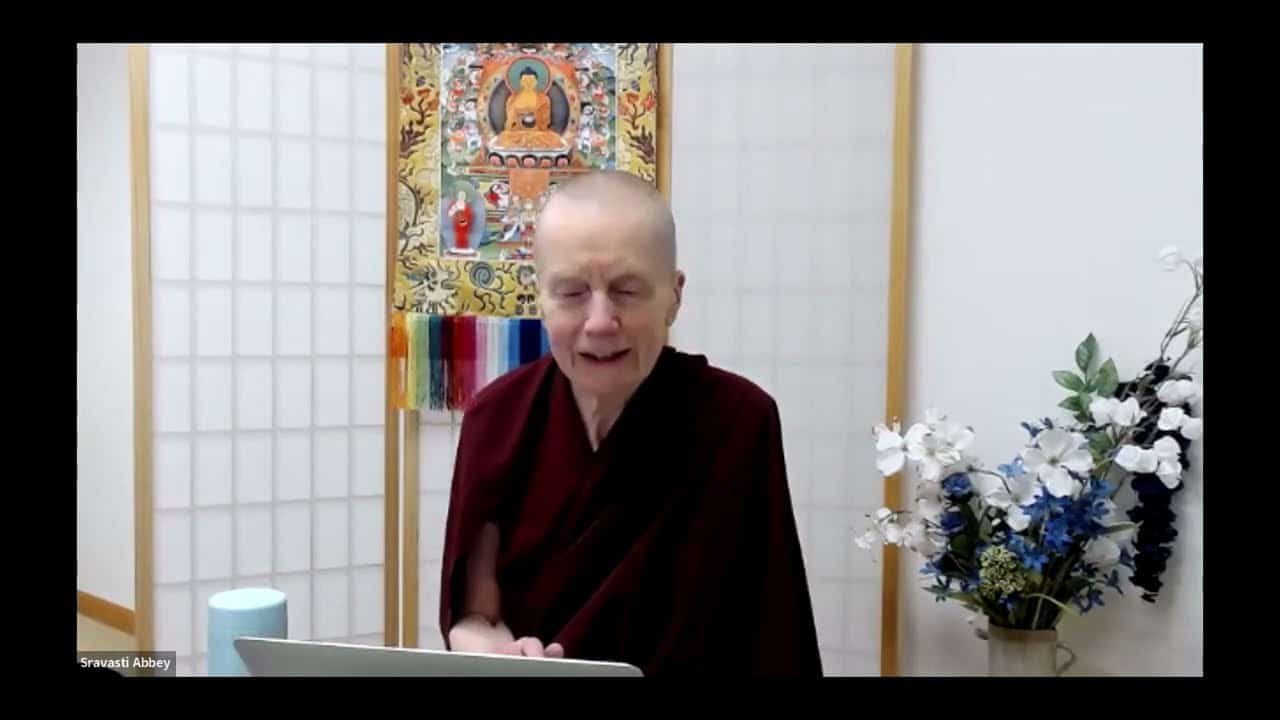Benefits of meditating on the the 12 links
67 Samsara, Nirvana, and Buddha Nature
Part of an ongoing series of teachings (retreat and Friday) based on the book Samsara, Nirvana, and Buddha Nature, the third volume in The Library of Wisdom and Compassion series by His Holiness the Dalai Lama and Venerable Thubten Chodron.
- Causal dependence and emptiness
- Explanation of Wheel of Life
- Each link is dependent on specific causes and conditions
- Avoiding the extremes of nihilism and absolutism
- Counteracting wrong views
- Past and future lives, existence of different realms, actions and results
- Results come from concordant causes
- Causes for duhkha and relief from duhkha exists in our own minds
- Attachment to worldly pleasures leading us to rebirths
- Developing compassion for self and others
Samsara, Nirvana, and Buddha Nature 67: Benefits of Meditating on the 12 Links (download)
Contemplation points
- Consider that all sentient beings – other humans, animals, bugs, etc all simply want happiness and freedom from suffering. Why is it that really spending time contemplating this makes us happier, less suspicious, and more open to others?
- Why is understanding the disadvantages of samsara necessary for attaining awakening? Explain this in your own words.
- Contemplate each of the benefits of meditating on the Twelve Links presented in the text. Making examples from your own life, unpack each one and investigate how it benefits you in this and future lives, enabling you to abandon the causes of samsara:
- Meditating on causal dependence helps us avoid the two extremes of nihilism and absolutism
- Reflection on dependent origination clears away a host of wrong views and inspires us to be more mindful of our motivations and actions and to purify misdeeds.
- Recognition that as the causes of dukkha exist within us, so does relief from dukkha.
- Contemplating each link individually accentuates its unsatisfactory nature and inspired to make our lives meaningful, we put energy into generating bodhicitta and realizing the ultimate nature of reality.
- Thinking about the beginninglessness of samsara pulls us out of fixation of our own problems, compassion for others arises, our obsession with the happiness of only this life fades, and the aspiration for full awakening gives our lives greater meaning.
- Seeing that I and mine are dependent phenomena releases the tightness of having to prove and defend ourselves and we derive inner satisfaction from creating the causes for well-being, liberation, and full awakening.
- We may have doubts about views such as rebirth or karma. What is a beneficial way to think about these teachings until your conviction in it is firm?
- How does purification help you to be more mindful of your actions in daily life and avoid negative karma ripening?
- Spend a week contemplating impermanence and death in your daily meditation. Observe how your mind changes. Note: Don’t do this reflection if you are feeling depressed or sad, in which case, focus on positive reflections that invigorate the mind.
Venerable Thubten Chodron
Venerable Chodron emphasizes the practical application of Buddha’s teachings in our daily lives and is especially skilled at explaining them in ways easily understood and practiced by Westerners. She is well known for her warm, humorous, and lucid teachings. She was ordained as a Buddhist nun in 1977 by Kyabje Ling Rinpoche in Dharamsala, India, and in 1986 she received bhikshuni (full) ordination in Taiwan. Read her full bio.


